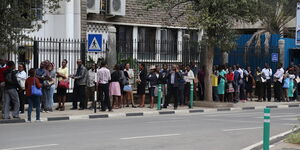Kenya takes to corruption as fish to water. Ranked 144 out of 180 countries on Transparency International’s 2018 Corruption Perception Index, it is no wonder the country is perceived as one of the world’s most corrupt countries.
The Jubilee administration under President Uhuru Kenyatta's second term did little in 2019 to change this perception, with multi-billion shilling scandals hitting the headlines at an alarming record.
Here’s a list of 5 scandals that left the country in shock over the course of 2019.
1. Lands Ministry Failure to Account for Ksh20 Billion
The shocking Auditor-General Edward Ouko's report painted a grim picture of glaring discrepancies in the financial documents of the ministry headed by Lands Cabinet Secretary Farida Karoney.
An example cited was the auditor's realisation that cash in hand as captured in the department's financial statement was Ksh201,038, yet the same item had a corresponding entry of Ksh8.2 billion in the trial balance.
In a separate incident, a recurrent bank account managed by the ministry showed a balance of Ksh1.8 million against Ksh1.8 billion declared in the trial balance as at the end of the financial year.
A further Ksh2 billion claimed to have been spent on compensation of employees, was charged to the acquisition of utilities, training expenses, communication, vehicle maintenance, fuel and purchase of office furniture.
2. The Mega-dams Scandal
The headline, as captured by Kenyans.co.ke on February 25, 2019, entailed Directorate of Criminal Investigations (DCI) summoning companies linked to the currently evolving multi-billion shilling dam scandal.
It was alleged that one firm was paid Ksh8 million for cutlery, while another company supplied towels worth a mind-boggling Ksh22 million.
These are not strange items to supply when it comes to government tenders - until you ask yourself what role they play in the construction of a dam.
The named companies were stated as being linked to the fraudulent construction of both Arror (at a cost of Ksh38.5 billion) and Kimwarer Multi-purpose dams (at a cost of Ksh28 billion).
Top government officials were summoned by the DCI, but no action has been taken to bring the perpetrators to book, a script that is all too familiar to Kenyans.
3. Triple Governor arrest over corruption allegations
Governors Moses Kasaine Lenolkulal (Samburu), Ferdinand Waititu (Kiambu) and Mike Sonko (Nairobi), all found themselves on the wrong side of the law over fraud allegations.
Lenolkulal was linked to a Ksh84.7 million fuel-supply scandal in which Oryx Service Station, which police believe is owned by the governor and a close associate, was given a tender to supply the county government against the law. The Ethics and Anti-Corruption Commission (EACC) officials were also looking into the fraudulent expenditure of Ksh2 billion.
Waititu on his part - alongside his wife and daughter - was being investigated over the embezzlement of Ksh588 million from county coffers, believed to have been siphoned through irregular procurement for the upgrading of several roads in Kiambu County.
Sonko, on the other hand, was arrested and charged with crimes of conflict of interest arising from having received money from the county of Nairobi while serving as governor, unlawful acquisition of public property, money laundering and other economic crimes totaling to Ksh357 million.
Interestingly, all the governors were slapped with cash bails, as the courts gather evidence in a bid to prosecute the trio in the future.
On significant move by the courts that has been lauded by many, is the decision to bar all accused governors from office cosequently leaving the counties in the hands of deputy governors and in the case of Nairobi setting the stage for the ascend of speaker Beatrice Elachi to the top seat.
4. Kenya Power bogus transformers scandal
The Daily Nation covered this story involving the alleged procurement of defective transformers valued at over Ksh4.5 billion.
It was reported that the firm was yet to recover three missing tender documents namely; tender evaluation report, budget approval, and a negotiation report, to justify the suspicious procurement process.
The power supplier was also in the spotlight following a Ksh1 billion pre-paid token generation revenue fraud.
It is claimed that some of its employees manipulated the system to divert the company’s revenue into their own pockets.
The shrewd employees are said to have created a system to generate extra tokens, which facilitated the sale of genuine tokens in the black market.
Five employees from the state corporation’s IT department were suspended by the company and placed under investigation.
5. NHIF Scandal
This particular saga struck the nerve of the majority of Kenyans after it was revealed that the National Health Insurance Fund could have lost more than Ksh10 billion in false medical claims.
Investigators claimed that the figure had been flagged as fraudulent and was part of about Ksh50 billion paid to NHIF by Treasury as capitation premiums for medical cover for civil servants, Kenya Police Service, National Youth Service, and Kenya Prisons Service since 2013.
The detectives claimed to have stumbled on a pile of documents related to premiums from special medical schemes worth Ksh12.7 billion annually which was suspected to have been arrived at following collusion between NHIF officials and hospital administrations, whereby they double-charged the government in medical bills.
It is important to note that the highlighted scandals are but a tip of the iceberg of the massive corruption scandals that rocked the nation, with countless others such as the Maasai Mara University expose aired on Citizen TV and the fake gold scandal forming a long list of notable mentions.
Transparency International-Kenya programmes manager, Sheila Masinde, stated that some of the key institutions in the anti-corruption chain have faced significant challenges in delivering their mandates mainly because of a "pervading culture of impunity among the political and economic elite."












